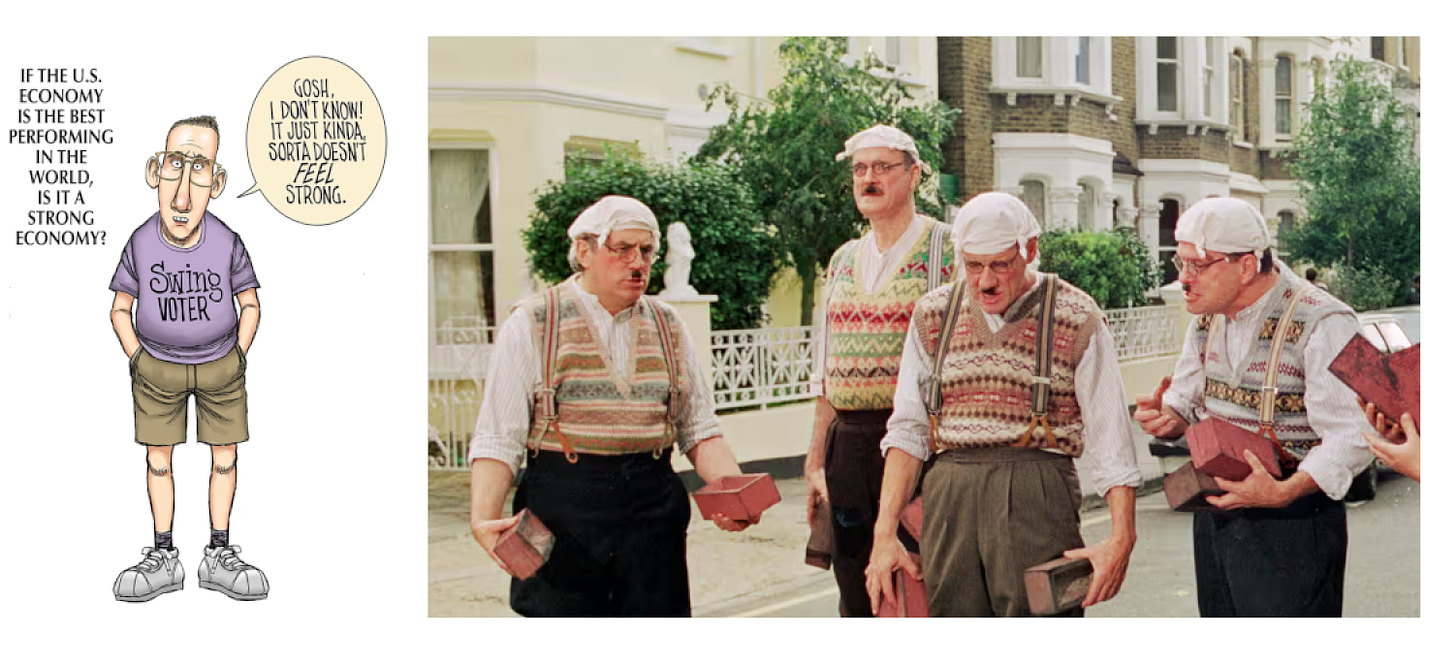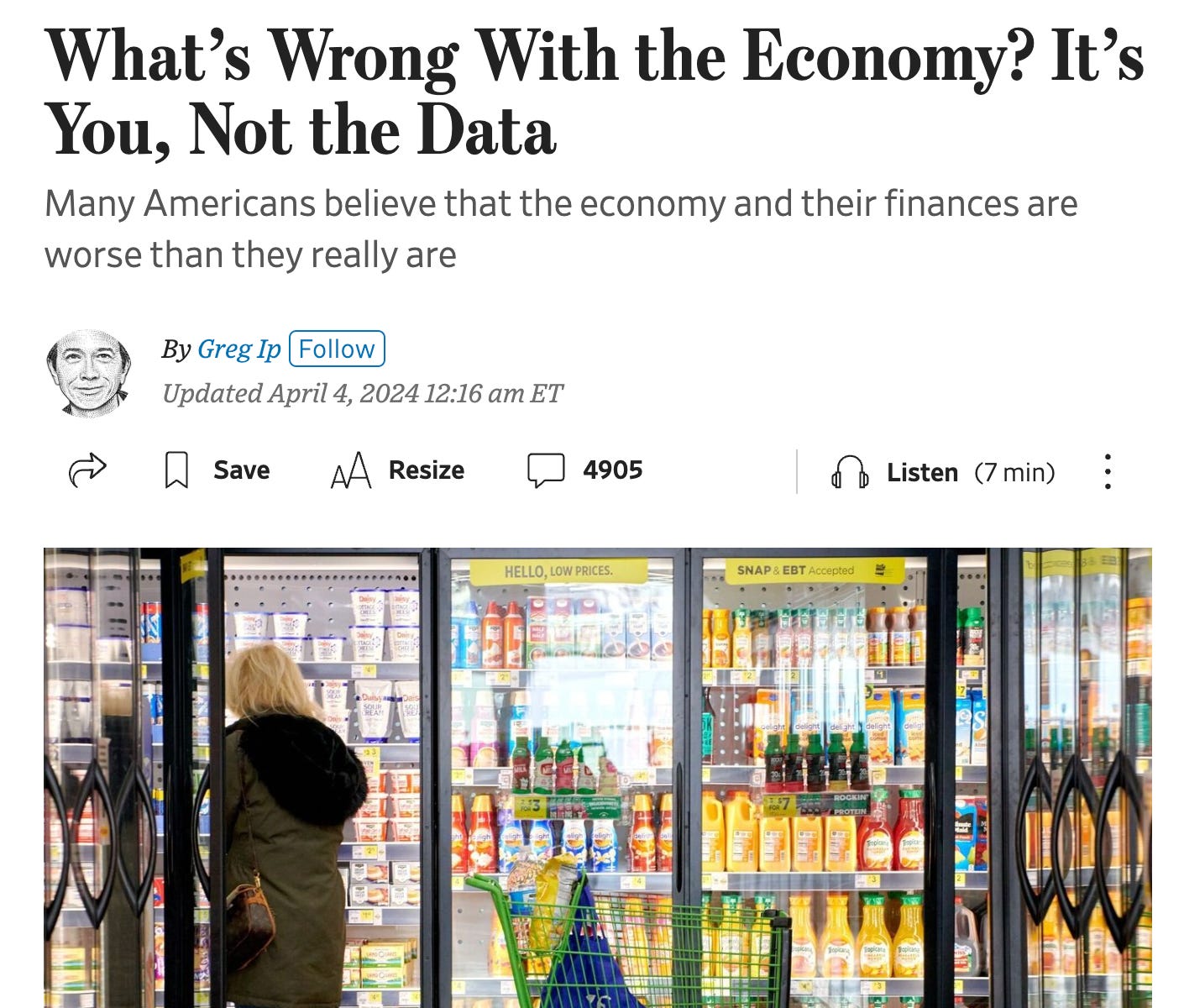![]()

by Matt Taibbi
“People are really tying Bidenomics and their perception of the economy to the inflation rate,” said Matt Monday of Morning Consult, in a new Bloomberg story titled, “Biden’s gains against Trump vanish against deep economic pessimism, poll shows.” It’s the latest entrant in an intensifying campaign to describe voters, especially in key electoral swing states, as morons and partisan haters who’ll deny reality itself out of political spite.
This campaign has been weirdly perverse in its mockery. Seattle Times cartoonist David Horsey recently tossed off a visual of the reality-denying swing voter, rendering him as a pudgy, confused hominid in the mode of Monty Python’s duncelike Gumbys. Having negative feelings about “the best performing [economy] in the world” is equivalent to denying who won the Super Bowl:

When the Wall Street Journal a few weeks ago ran “What’s Wrong With the Economy? It’s You, Not the Data,” I thought the “It’s not me, it’s you” framing had to be ironic, a spoof of these increasingly numerous “perception of the economy” pieces. Nope:

Noting that 74% of respondents in a recent poll said they felt inflation in the “past year” was going in the wrong direction, author Greg Ip noted flatly “it’s not true,” adding:
I’m not stating an opinion. This isn’t something on which reasonable people can disagree. If hard economic data count for anything, we can say unambiguously that inflation has moved in the right direction in the past year.
Ip might be technically right about the last year of inflation, but I’m not sure how many finance writers want to be in the business of deciding who belongs in the “reasonable people” club, given the last twenty years of unpunished thievery on Wall Street. One could argue a reasonable person would have marched on Manhattan and started defenestrating bankers ten years ago:
Many of these articles are about inflation, so it needs pointing out that the CARES Act, a Fed-fueled bailout plan with major inflationary ramifications, passed on Donald Trump’s watch. It was bipartisan, but I was critical of it and spent much of 2020 traveling the country for a never-published project on the unfortunately enormous universe of Covid-era finance scams. Voters may trust Trump more because his pre-Covid economy was better, and he’s signaled he at least listens to public frustrations by criticizing institutions like the Fed, but Biden made moves he should get credit for, too (like trying to lift the bar on bulk pharmaceutical negotiations). Debating which president is better is irrelevant, though. This “perception” campaign is 100% about press douchebags demonizing people who’ve been screwed before, during, and after Trump.
Especially in the last two decades, the public has been served one financial “shit burger” after another (see today’s Q&A with Chris Irons a.k.a.
for more). They’ve been ripped off by everyone: banks that sold defective mortgage securities to their retirement funds, pharma companies that charge them thousands per course of medication, private equity titans who strip healthy firms for assets and vaporize jobs, all phenomena that widened inequality and were enabled by hyper-aggressive monetary “rescues” and stimulus programs like Quantitative Easing.
Yet when they’re not sketching swing voters as cartoon dopes, these “economic pessimism” pieces sooner or later blame the ordinary person for failing to appreciate his or her good fortune. Scripps months ago asked, “Is the economy the issue, or the problem with America’s perception?” In it, they noted that 78% of the country felt “the economy” was going in the wrong direction. “But is it?” the piece asked, stroking its rhetorical chin before adding: “After all, most Americans vote not on statistics, but based on how they feel.”
This is an update of the old coverage trope in which everyone from Occupy protesters to Tea Partiers are always described as having “passions,” while policymakers always have reasons. This new thing is about redefining “the economy” as a solved issue, but for the hurt feelings of conspiratorial holdouts. CNN last summer sighed about economic perceptions that “much of the stagnation comes from dug-in partisans,” in a piece about Americans who erroneously “think the economy is getting worse.”
A friend in finance grumbled about how the quantity of professional “economy masturbators” is getting to be as big as the stable of “foreign policy masturbators” on call for articles about Ukraine and Gaza, but a Los Angeles Times story on this topic, “Economists see a ‘spectacular’ economy. Most voters don’t. Can Biden turn that around?” recalled a different group of hype artists:
The superlatives from giddy economists read like the promo blurbs on movie ads: “Just a perfect report” — Mark Zandi, Moody’s Analytics. “Stunning and spectacular” — Diane Swonk, KPMG. “Hard to imagine how things could look better” — UBS’ Brian Rose. “This year has been like Rock ‘Em Sock ‘Em Robots” — Dan North, Allianz Trade Americas.
Stunning and spectacular? Forget my former colleague Peter Travers at Rolling Stone. Not even the fabled Walter Monheit of Spy Magazine — a human hype machine who cranked out blurbs like “Oscar has a new friend in Transylvania!” about Bram Stoker’s Dracula and gave every movie “Four monocles way up!” — could match this breathless enthusiasm. But the LAT was frustrated. Despite all those Must See! reviews of Biden’s economy from trusted sources like UBS and Allianz, “From most Americans, all you get is a Bronx cheer.”
Some of these articles even show a big reason why stats might not matter at the ground level, but go on to rip the irrational voter anyway. “American economic pessimism has been bafflingly persistent despite major indicators showing that the economy is actually strong,” wrote Vox last month, in yet another piece about “Gaps between perception and reality” in the economy. That same article showed a graph from the Fed charting consumer credit balances:

That graph by itself explains the American pucker factor. Commentators refuse to see it. They also won’t grasp that public mistrust usually has less to do with one-time calculations at the supermarket register than with decades of accumulated frustrations about the increasingly numerous aspects of American life that are straight-up scams, or guaranteed income schemes for the failure-proofed rich.
For instance: a subtext to the fury about the Columbia University protests this week is the school’s obscene $89,000 tuition. Reeling in soaring tuition checks from guilt-ridden parents in exchange for an (often) neither-very-good-nor-useful education is a gravy train any good student loan activist knows is only possible thanks to myriad crookednesses baked in the system. Between over-availability of federal credit, an extraordinarily punitive job market (requiring degrees even for menial office work, though the same degrees guarantee nothing), the failure of even public universities to pass ballooning endowments back to students as tuition savings, and the historical inability to discharge student debt in bankruptcy (another area where Biden has taken some action), colleges can raise prices forever without either improving their product or worrying about students not earning enough to pay bills.
People aren’t stupid. They’ll read that Pfizer pulled in $58 billion in profits last year, and every time they go to a pharmacy or see a hospital bill, they’ll remember somewhere that these companies benefit from a slew of subsidies, from free R&D to protections from generics and imports.
When they go to an airport on Thanksgiving, they hear an airline rep telling them it now costs $30 for a carry-on. Do they know all the relevant history, that in the 2010s executives at the big four airlines gorged themselves on $43.7 billion in buybacks before demanding and getting, a $50 billion Covid bailout, which in turn resulted in more buybacks, mass layoffs, and even crappier, more dangerous service? No, but they have a good idea they got screwed somewhere, and occasionally even hear a politician admit it. “Buyer’s remorse,” said DC congresswoman Eleanor Norton, characterizing the airline rescue she supported.
A lot of “pessimistic” voters struggle to pass credit checks just to rent an apartment, but see at the same time that a big bank in America can buy the world’s most toxic subprime company (as Bank of America did with Countrywide) or promote murder and mayhem by evading money-laundering (as HSBC did by serving drug cartels), and they not only get away with it, but get rewarded with fifteen years of low-to-zero interest rate monetary policies. It’s literally impossible to not make money in banking borrowing at zero — you’d have to be an actual Gumby to pull it off — which makes it all the more offensive that every article about banks like Goldman, Sachs or JP Morgan Chase raves about the amazing smartness of their financial magicians. Even with all those brains, they can’t manage their firms: pre-Covid, they blew all their gains on dividends and awards, doling out $121 billion in buybacks in 2019 alone, and so also had to be rescued in the historic $2.2 trillion Covid bailout.
To prop up that pandemic economy, and make sure people weren’t disenfranchised by those lockdowns we now know we may not have needed at all, our Federal Reserve went on an unprecedented three-year, $5.2 trillion buying spree. That just happened to coincide with a $2.58 trillion bump in the net worth of America’s 737 (now 808) billionaires. The curves for national and international central bank spending and billionaire net worth always overlap smoothly:

Most Americans have no objection to people making money, even gobs of it. Probably most even respect a decent hustle (we have affection for everything from Chia Pets to Flowbees in America). But when people have no chance at all, and money is transferred by the trillion straight from the Fed to accounts of the idiot rich while hardworking people are asked to pay for it in taxes and inflation, they tend to get pissed off, and it takes them much more than a year to get over it.
The basics — school, medicine, doctor visits, a home, retirement — have become less and less attainable, while politicians keep waving through giant handouts for the scummiest layers of American society, the leveraged buyout artists and force-placed insurance carriers and pharmaceutical swindlers, the very people making the obstacles higher. These people also happen to be the largest sponsors of both politicians and media organizations.
These things don’t inspire “pessimism,” but rage. How does anyone justify caricaturing people as dummies for feeling it?

